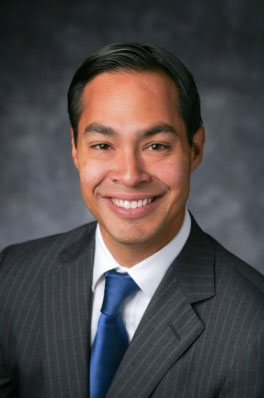Castro was born in San Antonio, Texas, the son of Maria “Rosie” Castro and Jessie Guzman. He is the identical twin brother of current United States Representative Joaquin Castro; Julián is one minute older than Joaquin: they were born at 2:40 and 2:41 am.
Their mother was a Chicana political activist who helped establish the Chicano political party La Raza Unida, and who ran unsuccessfully for the San Antonio City Council in 1971. Castro once stated, “My mother is probably the biggest reason that my brother and I are in public service. Growing up, she would take us to a lot of rallies and organizational meetings and other things that are very boring for a 10-year-old”. Castro attended Thomas Jefferson High School in San Antonio, where he played football, basketball and tennis. He skipped his sophomore year and graduated in 1992,ranking ninth in his class.He attended Stanford University.
Castro graduated from Stanford in 1996 with a bachelor’s degree in political science and communications. He said he began thinking about entering politics while at Stanford, where he and his brother launched their first campaigns and won student senate seats, tying for the highest number of votes. Castro has credited affirmative action for his admission into Stanford, telling The New York Times, “Joaquin and I got into Stanford because of affirmative action. I scored 1210 on my SATs, which was lower than the median matriculating student. But I did fine in college and in law school. So did Joaquin. I’m a strong supporter of affirmative action because I’ve seen it work in my own life”. Between his sophomore and junior years, Castro worked as an intern at the White House during the presidency of Bill Clinton.
In 2001, Castro was elected to the San Antonio City Council, winning 61 percent of the vote. At age 26, he was the youngest city councilman in San Antonio history, surpassing Henry Cisneros, who won his council seat in 1975 at age 27. Castro represented District 7, a precinct on the city’s west side with 115,000 residents. The population was 70 percent Hispanic and included a large number of senior citizens.
Castro ran for mayor of San Antonio in 2009, announcing his candidacy on November 5, 2008. Castro hired Christian Archer, who had run Hardberger’s campaign in 2005, to run his own 2009 campaign. Castro won the election on May 9, 2009 with 56.23% of the vote, his closest opponent being Trish DeBerry-Mejia. He became the fifth Latino mayor in the history of San Antonio. He was the youngest mayor of a top-50 American city. Castro easily won re-election in 2011 and 2013, receiving 82.9% of the vote in 2011 and 67% of the vote in 2013.
In 2010, Castro created SA2020, a community-wide visioning effort. It generated a list of goals created by the people of San Antonio based on their collective vision for San Antonio in the year 2020. SA2020 then became a nonprofit organization tasked with turning that vision into a reality. Castro also established Cafe College in 2010, offering college guidance to San Antonio-area students. In 2012 he led a voter referendum to expand pre-kindergarten education.
In March 2010, Castro was named to the World Economic Forum’s list of Young Global Leaders. Later that year, Time magazine placed him on its “40 under 40” list of rising stars in American politics.
Castro gained national attention in 2012 when he was the first Hispanic to deliver the keynote address at a Democratic National Convention in Charlotte, North Carolina. Following the 2012 elections, Castro declined the position of United States Secretary of Transportation, partly with an eye on running for governor of Texas after 2017. However, in 2014, Castro accepted President Barack Obama’s offer of the position of United States Secretary of Housing and Urban Development. Castro resigned as mayor effective July 22, 2014, so that he could take up his duties in Washington. The San Antonio City Council elected councilmember Ivy Taylor to replace him.
On May 22, 2014 the White House announced Castro as the nominee to be the next secretary of Housing and Urban Development (HUD) by President Barack Obama. He was confirmed by the Senate on July 9, 2014 by a vote of 71-26 and replaced Shaun Donovan, who was nominated to be the Director of the Office of Management and Budget. He took office on July 28, 2014. Following the announcement, Castro was discussed as a potential nominee for vice president for the Democratic Party in the 2016 presidential election.
On July 28, 2014, his first day in office, Castro was honored at a reception called “Celebrating Latino Cabinet Members” hosted by the Congressional Hispanic Caucus Institute.
Upon exiting office in 2017, Castro’s final memo outlined various accomplishments of the department under his leadership.These areas included HUD’s work to stabilize the housing market, rebuild communities struck by natural disasters through a $1 billion National Disaster Resilience Competition, expansion of lead safety protections in federally assisted housing, and the Affirmatively Furthering Fair Housing rule to “finally fulfill the full obligation of the Fair Housing Act.”
On October 15, 2015, Castro endorsed Hillary Clinton for president. Discussion of Castro as a candidate to run on the Democratic ticket with Hillary Clinton increased markedly in January 2016, as the Iowa and New Hampshire primaries approached.In late January, Castro began to campaign for Clinton in Iowa, a move interpreted as a test of his appeal to the electorate.
Castro has already visited the first in the nation New Hampshire primary state in 2018 and delivered the commencement address at New England College in Henniker, New Hampshire, on May 12, 2018. Castro stated that he would make his decision on whether to run in 2020 after the November 2018 mid-term elections.On December 12, 2018, Castro announced the formation of an exploratory committee.
Castro formally announced his candidacy for the 2020 presidential election on January 12, 2019. He is the first Texan in the 2020 race, and would be third-youngest president if elected. In his announcement, Castro emphasized Medicare-for-all, universal pre-K and a pathway to citizenship for undocumented immigrants as part of comprehensive immigration reform.
The Past, the Present and Possibly the Future of Julian Castro










